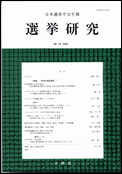Volume 36, Issue 2
Japanese Journal of Electoral Studies
Displaying 1-13 of 13 articles from this issue
- |<
- <
- 1
- >
- >|
-
2020 Volume 36 Issue 2 Pages 9-24
Published: 2020
Released on J-STAGE: November 16, 2023
Download PDF (1509K) -
2020 Volume 36 Issue 2 Pages 25-38
Published: 2020
Released on J-STAGE: November 16, 2023
Download PDF (2167K) -
2020 Volume 36 Issue 2 Pages 53-67
Published: 2020
Released on J-STAGE: November 16, 2023
Download PDF (1693K) -
2020 Volume 36 Issue 2 Pages 68-79
Published: 2020
Released on J-STAGE: November 16, 2023
Download PDF (1555K) -
2020 Volume 36 Issue 2 Pages 80-91
Published: 2020
Released on J-STAGE: November 16, 2023
Download PDF (1377K) -
2020 Volume 36 Issue 2 Pages 92-107
Published: 2020
Released on J-STAGE: November 16, 2023
Download PDF (1649K) -
2020 Volume 36 Issue 2 Pages 108-125
Published: 2020
Released on J-STAGE: November 16, 2023
Download PDF (1755K) -
2020 Volume 36 Issue 2 Pages 126-138
Published: 2020
Released on J-STAGE: November 16, 2023
Download PDF (1527K) -
2020 Volume 36 Issue 2 Pages 139-150
Published: 2020
Released on J-STAGE: November 16, 2023
Download PDF (2441K) -
2020 Volume 36 Issue 2 Pages 151-167
Published: 2020
Released on J-STAGE: November 16, 2023
Download PDF (1613K) -
2020 Volume 36 Issue 2 Pages 168-181
Published: 2020
Released on J-STAGE: November 16, 2023
Download PDF (1560K) -
2020 Volume 36 Issue 2 Pages 182-200
Published: 2020
Released on J-STAGE: November 16, 2023
Download PDF (1217K) -
2020 Volume 36 Issue 2 Pages 201-206
Published: 2020
Released on J-STAGE: November 16, 2023
Download PDF (1121K)
- |<
- <
- 1
- >
- >|
